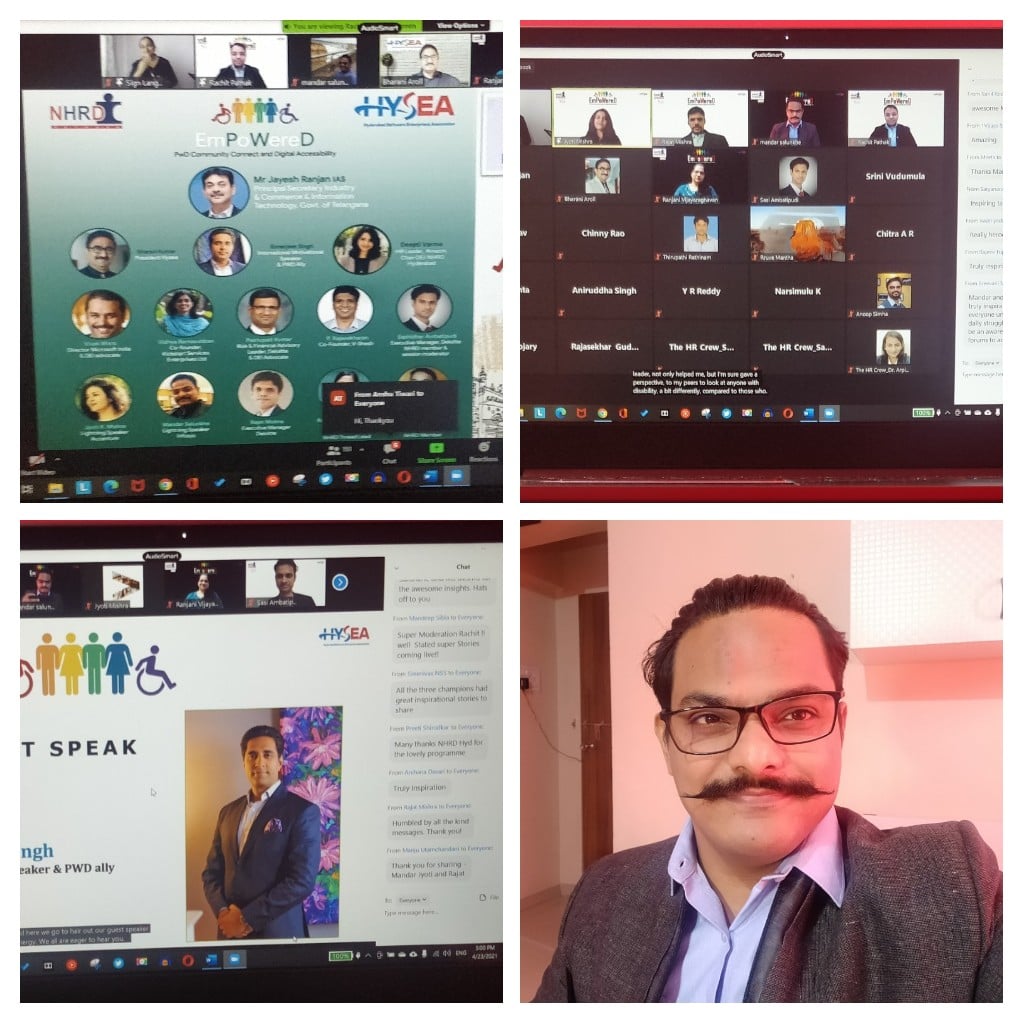If Someone requires critical information what if it is hidden? What if the information is right in front of you but you can’t decipher it? Nope, this isn’t a theme of the next Dan Brown book or Mission Impossible movie. But what it is, is a sad grim reality of information inaccessibility.
I had the opportunity and privilege to speak at the Nhrdn Hyderabad Chapter event held in Hyderabad. The event focused on digital accessibility. It was one of the prestigious moments for me as I was speaking to more than 200+ audiences which had industry leaders from Microsoft, Deloitte, and Hysea. We also had IAS officer Mr. Jayesh Ranjan who is an IT minister from the Telangana government in the audience. Rachit and Ranjani Vijayaraghavan, who have been so kind to remember me; gathered us for a pitch. Rachit has a unique style of simplifying things. The pitch was – a large, VIP audience, 7 mins each, and the topic was a personalized view on digital accessibility. #NoPressure.
This meant exploring a topic that wasn’t too familiar to me. digital accessibility. The event went well on 23rd Apr.
Let us all understand what is digital accessibility. Digital accessibility is the ability of a website, mobile application, or electronic document to be easily navigated and understood by a wide range of users, including those users who have visual, auditory, motor, or cognitive disabilities.
Now that we have understood the definition, let us understand how it impacts disabled folks. Imagine Google hasn’t invented Maps yet and you only have a physical map, printed in German with you while you are exploring rural Maharashtra. Feeling lost already!
Similarly, disabled individuals don’t have the required information available on a technology platform that could be accessible to all forms of disability. In my talk, I talked about my struggles with digital inaccessibility. Be it a complicated process of buying a disability-modified car, getting an invalid car license, or be it as simple as using an ATM from a wheelchair. Can you recall any driving license school, offering a course to the disabled? Can you recall any car manufacturer creating a standard car for disabled individuals (as recommended in Gov Notification Mar’07, Snippet attached)?
The saddest part is that about 3Cr Indians are disabled. 55% are literate and it would be safe to assume at least 60% of them have access to the internet. if they are trying to find information about disability job openings for example, how many of them would be getting a successful result? Meaning lack of information would be a prime reason they are not able to improve their living conditions?

And then to counter this- lack of information, the Indian Gov creates an app. Hurry!! Wait, wish I could rejoice. The app is called, Divyang Sarathi. And you do need a Divyang to access the information on it. God, while we label the current generation as Gen Z, this app is in the Stone Age era. This app is made for disabled individuals but has no means to include all disabilities to access the app. For example, there is no accessibility feature for the blind or hearing impaired. The audacity to call this app Sarathi, which translates to a companion but this app is hardly helping me. How do I call it a companion? The home screen has only 3 options – About us, Acts, rules, guidelines, and Suchana. Submenus are laughable. The Acts and Laws guidelines have a submenu in the form of snippets from the PDF files. How a blind person’s external screen reader is going to read through a picture? Few submenus have dynamic information that never loads. I wonder if this app was ever audited for accessibility standard V2.1. This particular app has no feature to ask a question or search for information. Where Amazon and Flipkart use your locations to share localized solutions, wonder if this idea has ever struck the developers of this app -which is the Ministry of Social Justice and Empowerment.
Is it too far-fetched to imagine an app that gives me localized information of all the things I as a disabled person may need, including car modification process and contacts, essential equipment vendors, tax benefits, gov policies, job opportunities, etc?
For a country that accomplished sending a satellite to Mars, on a budget less than a Hollywood movie, of course not. It is surely feasible but I guess it is not available because we don’t have the will nor is it our priority.
I want to change that.
———
P.S – link to the video of the talk Do listen to thoughts shared by fellow speakers Rajat Mishra and Jyoti as well. I start at 11.45 min
https://m.facebook.com/story.php?story_fbid=3762009690583186&id=100003225766213&sfnsn=wiwspwa

